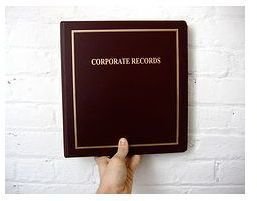Tips on Corporate Record-Keeping
Corporate Record-Keeping Requirements
Whether you’ve incorporated as a C-Corp, an S-Corp or a Limited Liability Company, you have set up an entity that needs to keep records. Beyond your bookkeeping records like business expenses, trial balances, cash flows, bank records, and other items your accountant will need to prepare your tax returns, there are legal documents you must create and keep.
Each state is different regarding corporate record-keeping, however, most are similar in nature. To determine what your state requires, visit your Corporation Commission or Secretary of State for more information. These organizations can be found by an Internet search and will explain your state’s corporate rules including record-keeping.
Keep in mind your corporation is an entity more than likely created to protect you and your partners’ personal liability. Follow these recommended basics for keeping your corporate records:
- Articles of Incorporation - These are created when a corporation is formed. Your state can offer you an example of what should be included in your articles of incorporation. For tips on incorporating, read How to Incorporate On Your Own. This article provides good templates for you to use as well.
- Bylaws or Operating Agreement - For corporations, you must create bylaws and for a limited liability company, an operating agreement is needed. These documents outline the corporation’s procedures on how the business will be run including shareholder and board of director meetings and assignments.
- Resolutions - These are resolutions defined by the board of directors or members of a limited liability company. They may include things like stock assignments and actions voted and accepted by the board of directors. A template for resolutions can be found in our Media Gallery.
- Meeting Minutes - These are usually written and signed by the Secretary of the corporation and kept in your meeting minutes book. These should list all old and new business issues passed by the board or tabled by the board as well as an agenda.
- Annual Meeting Minutes - A limited liability company is required to have at least one shareholder meeting each year. Other corporations may have more than one meeting per year. These minutes should include who is elected to the board of directors each year and a copy kept with your corporate records. A template for corporate meeting minutes can be found in the Media Gallery.
- Communications to Shareholders - A copy of every communication that is made to the shareholders whether it is via email, snail mail or facsimile should be kept in your corporate record book.
- List of Shareholders - Keep a list of current shareholders at all times. If shareholders change, keep a record of old shareholders and how stock was transferred.
- Annual Reports - Most corporation commissions require you to send an annual or semi-annual report if you are a corporation along with a small fee. Limited liability companies usually do not have to file annual reports with the state, but check with your state to make sure.
- Financials - Year end financials and tax returns should be kept with your corporate records as each shareholder is required by law to have access to these records. Keeping accurate and timely financials and tax returns in one place are also important when applying for loans to fund your business, if needed.
- Corporate Dissolutions - If your corporation ceases to exist, you will need to file dissolution forms with your corporation commission. A sample copy of a corporate dissolution is included in our Media Gallery.
Corporate Record-Keeping Tips
Consider these corporate record-keeping tips:
Search the Internet for “Corporate Kits.” You can find these corporate kits in all prices and sizes. Each company can design your corporate kit based on your type of entity. Further, these books provide spaces for meeting minutes, resolutions, stock certificates, and other corporate records. These companies can also provide a corporate seal you can utilize for certain legal documents.
File your annual reports on time. Often, if they are late, it will cost your corporation money in late fees.
Scan a copy of all of your corporate records and save on a CD. This will enable you to email corporate records when asked and are useful for accountants, bankers, and franchisors if you are a franchised business.
Although some experts say corporate records such as tax returns only need to be kept for seven years, they should be kept indefinitely. This is where scanning can be helpful to lessen the space needed for the records.
Lastly, if you don’t feel confident about creating or keeping your corporate records, you can find firms both on the Internet and local firms in your area that can create and keep all of your corporate records so you follow corporate record-keeping guidelines properly.
